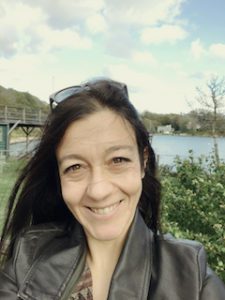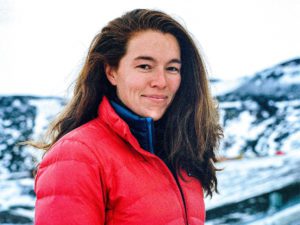WHOI scientists receive 2022 Simons Early Career Investigator in Marine Microbial Ecology and Evolution Awards
Woods Hole, MA – Two Woods Hole Oceanographic Institution scientists have received prestigious Simons Early Career Investigator in Marine Microbial Ecology and Evolution Awards. Maria Pachiadaki and Harriet Alexander are both assistant scientists at WHOI, focusing on different aspects of microbial ecology.
Microbes inhabit and sustain all habitats on Earth. In the oceans, microbes capture solar energy, catalyze biogeochemical transformations of important elements, produce and consume greenhouse gasses, and provide the base of the food web.
The purpose of these Simons Foundation awards is to help launch the careers of outstanding investigators in the field of marine microbial ecology and evolution who will advance our understanding through experiments, modeling or theory.

Maria Pachiadaki is a 2022 Simons Early Career Investigator in Marine Microbial Ecology and Evolution Awards recipient.
Pachiadaki and Alexander both share an interest in the function of microorganisms, but they study different groups. Pachiadaki centers on unicellular organisms without a nucleus, while Alexander centers on unicellular organisms with a nucleus; they unite to analyze the interactions between these two broad groups.
Pachiadaki is a microbial ecologist whose overarching aim is to unveil the mysteries of microbial life in the ocean's aphotic realm. She is interested in the identity, function and activity of dark ocean microorganisms and their effects on global ecosystem processes related to ocean deoxygenation. Pachiadaki uses a combination of approaches and techniques to address questions on the distribution and activity of microorganisms linked to climate change with emphasis on carbon dioxide fixation and nitrogen cycling. She also works on the development of technology in marine microbial ecology.
“I am honored to be an award recipient this year,” said Pachiadaki. “As a passionate microbiologist, I make it my mission to unveil the mysteries of the microbial life of the aphotic ocean realm and help answer long-awaited questions about the deep ocean.”

Harriet Alexander is a 2022 Simons Early Career Investigator in Marine Microbial Ecology and Evolution Awards recipient.
Alexander combines classic oceanographic approaches with a specialization in computational biology and molecular biology to conduct her work. She and her research group work to investigate the response of eukaryotic phytoplankton to the changing ocean environment. Most recently, she has been interested in understanding the ecological role of ‘pan genomes’ (an entire set of genes within a species) in eukaryotic organisms. Her lab focuses on the maintenance of genetic diversity in planktonic populations and the role of biodiversity in ecosystem functioning.
“It is exciting to be recognized for the collaborative work we do here at WHOI,” Alexander said. “Our lab focuses on the development and application of computational approaches to oceanographic questions. We aim to make our work openly available and reproducible, so that we can facilitate work across groups to make scientific progress.”
###
Woods Hole Oceanographic Institution (WHOI) is a private, non-profit organization on Cape Cod, Massachusetts, dedicated to marine research, engineering, and higher education. Established in 1930, its mission is to understand the ocean and its interactions with the Earth as a whole, and to communicate an understanding of the ocean’s role in the changing global environment. WHOI’s pioneering discoveries stem from an ideal combination of science and engineering—one that has made it one of the most trusted and technically advanced leaders in fundamental and applied ocean research and exploration anywhere. WHOI is known for its multidisciplinary approach, superior ship operations, and unparalleled deep-sea robotics capabilities. We play a leading role in ocean observation, and operate the most extensive suite of ocean data-gathering platforms in the world. Top scientists, engineers, and students collaborate on more than 800 concurrent projects worldwide—both above and below the waves—pushing the boundaries of knowledge to inform people and policies for a healthier planet. For more information, please visit www.whoi.edu
